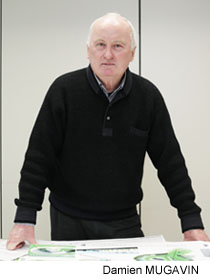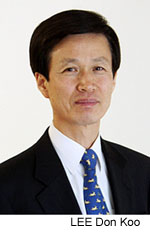Prof. Damien MUGAVIN (Dept. of Landscape Architecture and Rural System Engineering, College of Agriculture and Life Sciences)
 "Things have changed a lot over the last decade," began Professor Damien Mugavin, the first foreign professor in SNU's history."There were some difficulties at first, but SNU feels like home to me now."
"Things have changed a lot over the last decade," began Professor Damien Mugavin, the first foreign professor in SNU's history."There were some difficulties at first, but SNU feels like home to me now." Professor Mugavin came to SNU in 2001. At that time he experienced a lot of difficulties, including finding research materials as there were not any library catalogues in English. In addition, since there was no faculty housing on the Suwon campus back then, he had to stay in the female dormitory."I couldn't even go to the laundry room or the dorm cafeteria, because I was afraid I might get misunderstood. I now think of them as pleasant troubles," said the professor with a smile.
While expressing his surprise at the current number of foreign professors at SNU, currently over a hundred, he stressed that there remain many problems for foreign professors. For example, most SNU students prefer Korean professors as their academic advisers, making it hard for foreign professors to lead a research team."There is still a lot to do in order to globalize SNU's academic culture."
Majoring in Architecture at the University of Melbourne, Professor Mugavin grew interested in outdoor spaces."Modern architecture goes beyond a single building. It is more about the combination of interior and exterior space. My initial interest in exterior space extended to rivers and canals, and that's how I came to study urban landscape environmental design," he explained. Professor Mugavin, who has had many opportunities to work with the government on developing urban green space, also commented, "I have learned a lot from working in fast-developing Korea."
After retirement Professor Mugavin plans to go back to his hometown of Adelaide, Australia."If you ever visit Adelaide, please come by and say hello. SNU students are always welcome." He is already excited about the idea of resuming his long-time hobby, cycling.
With a Heart for Growing Forests
Prof. LEE Don Koo (Dept. of Forest Sciences, College of Agriculture and Life Sciences)
 "I am happy to leave without any regrets," remarked Professor LEE Don Koo (Forest Sciences), who was appointed as director of the Korea Forest Service in February 2011.
"I am happy to leave without any regrets," remarked Professor LEE Don Koo (Forest Sciences), who was appointed as director of the Korea Forest Service in February 2011.Professor Lee, one of the most prominent scholars in forestry (dendrology) worldwide, has devoted his time over the past ten years to the conservation of forests around the world. He was the second Asian to serve as chair of IUFRO (International Union of Forest Research Organizations), and is currently putting great effort into the establishment of AFoCO (Asian Forest Cooperation Organization)."AFoCO will be the first Asian international organization in the field of forestry. It will facilitate technology exchanges among Asian nations, which will greatly help in dealing with deforestation in this era of climate change."
On being asked about his educational philosophy, Professor Lee said that he can never overemphasize the importance of honesty and sincerity for a scholar. Furthermore, he hopes SNU students can take to having hobbies such as dancing, singing, and playing a musical instrument."To be a global leader, one should have talents besides brain power or language abilities." Professor Lee declared that he would like to continue contributing to the development of Korean forest studies even after he retires.
On to the New Phase of Life
Prof. LEE Seung Koo (Dept. of Plant Science, College of Agriculture and Life Sciences)
"If the first part of life is for learning and the second is for family and society, I believe the third part of life after retirement is for oneself. I am planning to fully enjoy it."
Professor LEE Seung Koo (Plant Science) is a scholar who revolutionized Korean horticultural sciences in the 80s by introducing the post-harvest system, a technique that aims to prolong the distribution and sales period of a food product by reforming each stage of the distribution process from the producer to the consumer.
He recalls the time when he first returned to SNU after teaching at Virginia Tech:"Back then, the infrastructure, especially power supplies, were so horrible that low temperature storage was impossible."
Having worked as a member of the steering committee of the National Agricultural Cooperative and the technology council of the Ministry for Food, Agriculture, Forestry and Fisheries, Professor Lee is trying to find a way to overcome the crisis of agriculture in Korea today."Korea can enhance the competitiveness of the agricultural industry by nurturing the food processing industry and its related technologies. Makkoli (Korean rice wine), for example, can greatly help the industry if properly globalized."
As the advisor of the student alpine club, Professor Lee is planning to climb Mt. Everest after retirement." Students these days seem to avoid challenges such as climbing a mountain. I highly encourage all SNU students to step off of campus sometimes and appreciate and enjoy the natural environment."
Constructing the Future of Greener Cities
Professor KIM Ki-Ho (Urban Design and Architecture, Graduate School of Environmental Studies)
"I am not sad at all to leave," said Professor KIM Ki-Ho in expressing his feelings on retiring." Just like commencement can mean both graduation and a new start, retirement can be the beginning of a new life."
Having majored in architecture and having practiced architectural design in the U.S., Professor Kim took up a professorship at SNU Graduate School of Environmental Studies in 1979."Urban design and architecture are inseparable from the environment,"
Professor Kim said, noting that"Cities in Korea are ‘dead' cities designed solely on the basis of economic feasibility, ignoring the social and environmental consequences." He introduced the idea of a"Han River Greenway" in his book A City's Vitality: The Greenway (2006) as a way of making Seoul more eco-friendly.
"What is important is the purpose of research. A meaningful research project is a study that can benefit the society." Even after retirement, Professor Kim plans to"continue researching and publishing more books on reconstructing Korean cities into healthier, greener ones."
Discovering the Potential of Food Science and Human Nutrition
Prof. LEE Yeon-Sook (Dept. of Food Science and Human Nutrition, College of Human Ecology)
"I am glad that I did my best at every moment. I am a bit nervous since I have never left school before, but I am also very excited to start a new life."
Professor LEE Yeon-Sook, who has taught at SNU since 1997, believes that"the most important thing in life is health. Thus, food science and human nutrition, which explore ways to improve our quality of life with healthier foods, is one of the most valuable fields today."
She gained world wide recognition for her physiological research on peptide, a compound containing amino acids commonly believed to be good for one's health.
"Though today peptide is commonly found in health foods, back then to undertake such research was difficult because it was an unpopular topic."
Professor Lee served as chair of the Korea Local Community Domestic Science Association and was also a member of the Rural Development Administration Appraisal Board. Through collaborating with the Ministry of Unification on a study on the nutrition levels of North Korean children, she said she realized the"hard reality of how the study of home economics is looked down upon even though it is vital to promoting and ensuring healthy living."
"It is unfortunate that many people associate food science and human nutrition exclusively with foods," says the professor."It is a field of infinite potential, as it is closely related to human physiology. I believe people still need to acknowledge its value."
Written by LEE SuKyoung, SNU English Editor, sukyoung123n@gmail.com
Reviewed by Eli Park Sorensen, SNU Professor of Liberal Studies, eps7257@snu.ac.kr
Proofread by Brett Johnson, SNU English Editor, morningcalm2@gmail.com

